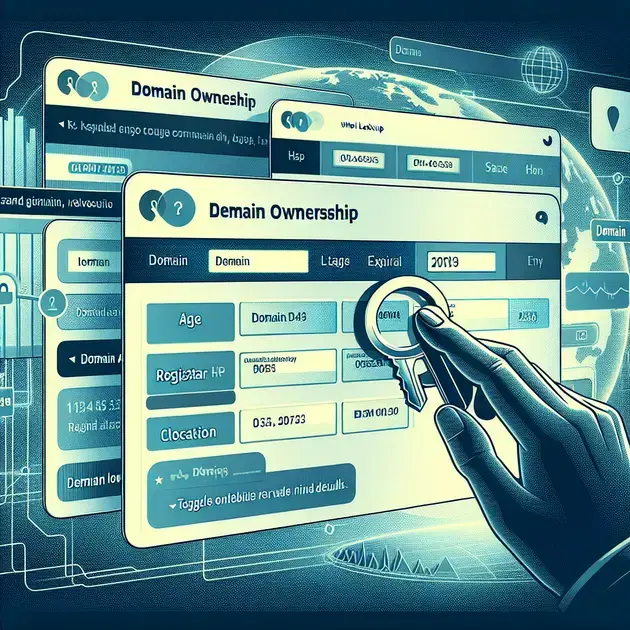When it comes to navigating the digital landscape, understanding ownership information for domain names is crucial. In this guide, we will explore the process of uncovering the individuals or organizations behind specific domains. Knowing who owns domain names can provide valuable insights for business decisions, partnerships, and legal purposes.
With the vast number of websites and online properties constantly growing, the ability to find ownership details of domain names has become increasingly important. Whether you are looking to purchase a domain, investigate a potential trademark infringement, or simply curious about the creator of a website, having access to this information can empower you in various ways.

Understanding Domain Name Ownership Information
Understanding domain name ownership information is crucial for various reasons, such as verifying the legitimacy of a website, identifying potential trademark infringement, and establishing contact with the domain owner. One effective way to access this information is by using domain WHOIS lookup tools. One popular WHOIS lookup tool is WHOIS.com, which provides detailed information about domain owners, registration dates, and contact details.
To access domain ownership information using WHOIS.com, simply visit their website and enter the domain name you want to look up. The tool will then generate a report containing all the relevant information about the domain owner. This data can help you make informed decisions when dealing with a particular website or domain.
Additionally, domain registrars like GoDaddy and Namecheap also offer WHOIS lookup services on their platforms. By logging into your account on these registrars and entering the domain name, you can retrieve ownership information quickly and easily. This information is valuable for conducting due diligence or resolving disputes related to domain ownership.
Overall, having access to domain name ownership information empowers individuals and businesses to navigate the online landscape more effectively and make informed decisions regarding web properties and online assets.
Uncovering the Individuals or Organizations Behind Domain Names
Uncovering the individuals or organizations behind domain names can provide valuable insights into the entity responsible for a particular website or online presence. One way to reveal this information is by using reverse WHOIS lookup tools, such as DomainTools. DomainTools allows users to search for domain names based on registrant details, email addresses, or keywords.
To uncover the individuals or organizations behind domain names using DomainTools, visit their website and navigate to the reverse WHOIS lookup tool. Enter relevant information about the registrant or domain name you are investigating, and the tool will generate a list of matching domain names along with their respective owners’ details.
Another method for uncovering domain ownership information is through social media and online platforms. Many domain owners include links to their social media profiles or websites on the domains they own. By exploring these profiles, you can gain further insights into the individuals or organizations behind the domain names.
Furthermore, collaborating with cybersecurity firms or investigative agencies can also help uncover the identities behind domain names through advanced tracking and analysis techniques. These firms have access to sophisticated tools and databases that can reveal hidden connections and ownership details.
Overall, uncovering the individuals or organizations behind domain names requires a combination of online tools, investigative techniques, and diligent research to unveil the true identity of the domain owner.
Empowering Business Decisions with Domain Ownership Insights
Empowering business decisions with domain ownership insights is essential for enhancing brand protection, conducting competitive analysis, and mitigating online risks. One way to leverage domain ownership information for business decisions is by monitoring changes in domain ownership through services like DomainIQ.
DomainIQ allows users to track domain ownership changes, receive alerts for specific domains, and analyze domain portfolios for strategic purposes. By monitoring ownership changes, businesses can identify potential acquisition opportunities, track competitor activities, and safeguard their intellectual property rights.
Another strategy for empowering business decisions is by conducting comprehensive due diligence on domain owners before entering into partnerships or collaborations. Platforms like WhoisXML API offer domain intelligence solutions that provide detailed insights into the ownership history, DNS records, and hosting infrastructure of domain names.
Additionally, utilizing domain monitoring services like BrandMonitor can help businesses protect their brand reputation and online presence by tracking unauthorized use of brand-related domain names. By staying informed about domain ownership insights, businesses can proactively address security threats and safeguard their digital assets.
In conclusion, empowering business decisions with domain ownership insights requires a proactive approach to monitoring, analyzing, and leveraging domain information to drive strategic initiatives and protect the interests of the organization.

Discovering Who Owns Domain Names
When it comes to discovering who owns domain names, there are several tools and strategies that can be utilized. One common method is to perform a WHOIS lookup, which provides information about the domain registrant, including their contact details. This can give you valuable insights into the individual or organization behind a particular domain name. Additionally, there are online services that specialize in domain ownership information and can provide more in-depth data.
Another approach to uncovering domain ownership is to look for clues within the website itself. Often, websites will have an “About Us” page or a footer section that includes details about the company or individual running the site. By carefully examining the content and structure of the website, you may be able to piece together information about the domain owner.
Furthermore, social media and online forums can also be valuable resources for identifying domain owners. Many businesses and individuals promote their websites through social channels, which can lead you to the rightful owner. Engaging with the website owner directly through these platforms can also provide you with additional information and insights.
Overall, discovering who owns domain names requires a combination of tools, investigation, and online savvy. By leveraging these resources effectively, you can gain a better understanding of the individuals or organizations behind the domains you are interested in.
Exploring the Background of Domain Ownership
Exploring the background of domain ownership involves delving into the history and context of how domain names are registered and managed. Understanding the evolution of domain ownership can provide valuable insights into the factors that influence the domain market and ownership trends.
One important aspect of exploring domain ownership is examining the regulatory frameworks that govern domain registration. Different countries and regions have varying rules and policies regarding domain ownership, which can impact how domains are acquired, transferred, and maintained.
Additionally, exploring the background of domain ownership involves analyzing the role of domain registrars and registries in managing domain names. These entities play a crucial role in the domain ecosystem, facilitating the registration process and ensuring the accuracy of domain ownership information.
Furthermore, studying the history of domain ownership can shed light on emerging trends and technologies that are shaping the domain industry. From blockchain-based domain management systems to innovative domain monetization strategies, there are constant developments that impact how domains are owned and utilized.
In conclusion, exploring the background of domain ownership is a multifaceted endeavor that requires a comprehensive understanding of the regulatory, technological, and market forces at play in the domain industry.
Unlocking Insights into Domain Ownership for Business Success
Unlocking insights into domain ownership is essential for businesses looking to establish a strong online presence and brand identity. By gaining a deeper understanding of domain ownership, companies can make informed decisions about their digital assets and strategies.
One key insight that businesses can uncover is the importance of securing relevant domain names that align with their brand and industry. By owning key domain names related to their products or services, companies can enhance their online visibility and protect their brand from potential infringements.
Furthermore, insights into domain ownership can also reveal opportunities for domain acquisition, resale, or leasing that can benefit a business’s bottom line. Understanding the market value of premium domains, including those related to “the most expensive wines in the world,” can guide businesses in making strategic investments in their digital assets.
Moreover, unlocking insights into domain ownership can help businesses navigate legal and intellectual property issues related to domain names. By staying informed about domain regulations, trademark considerations, and dispute resolution mechanisms, companies can mitigate risks and protect their online interests.
In summary, by unlocking insights into domain ownership, businesses can optimize their online presence, protect their brand assets, and capitalize on opportunities in the dynamic domain market.
Conclusion
Understanding who owns domain names is crucial in the digital landscape, and various tools like WHOIS lookup and website clues can unveil valuable insights about the individuals or organizations behind domains. By leveraging these resources effectively, one can gain a comprehensive understanding of domain ownership, enhancing online security and transparency.
Exploring the background of domain ownership delves into the history and regulatory frameworks governing domain registration. By analyzing the role of domain registrars and emerging technologies, businesses can adapt to market trends and ensure accurate management of their digital assets. This multifaceted endeavor demands a deep understanding of the regulatory and technological dynamics shaping the domain industry.
Unlocking insights into domain ownership is pivotal for business success, enabling companies to establish a strong online presence and protect their brand identity. By securing relevant domain names, understanding market values, and navigating legal considerations, businesses can optimize their online strategies, safeguard their assets, and capitalize on opportunities in the dynamic domain market.